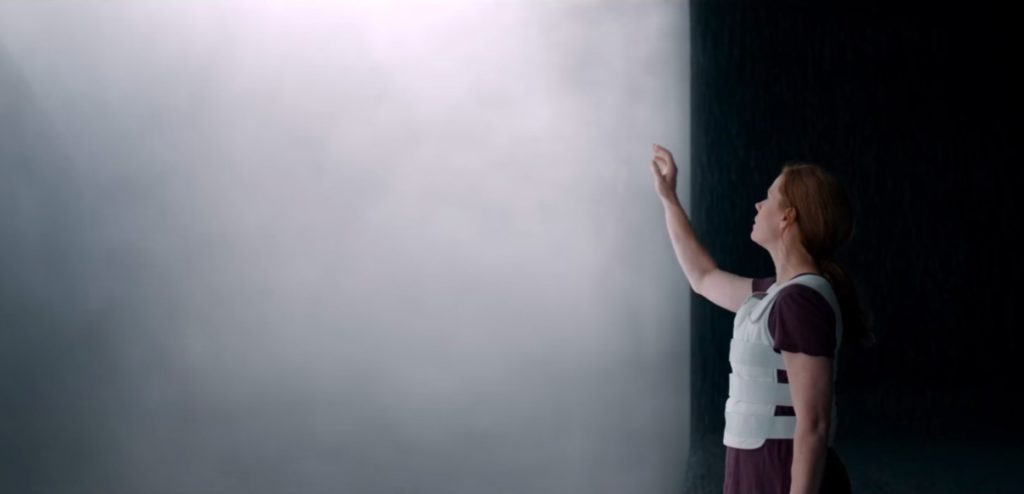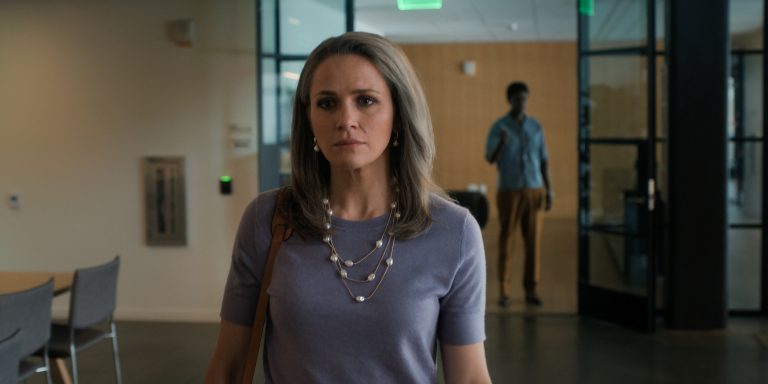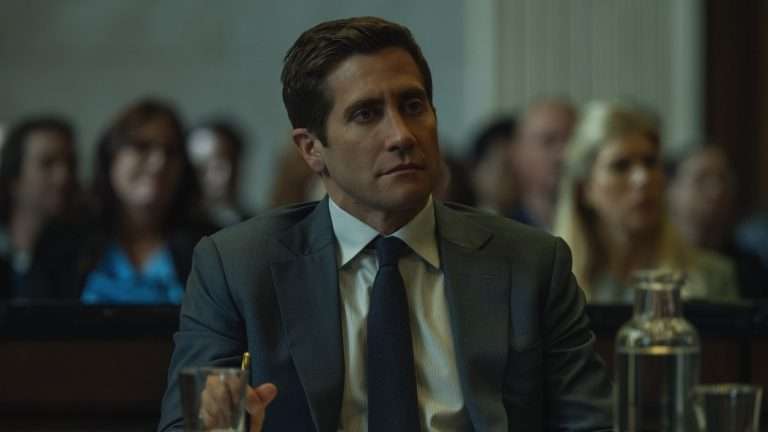It seems like every year, there’s at least one filmmaker taking a stab at making a high-budget, high-concept sci-fi film loaded with special effects, but one that is far closer to a drama than a blockbuster, a film that uses its high concepts to make grand statements about (usually) humanity. We’ve had the survival-adventure stories, like Gravity (2013) and The Martian (2015), and we had the emotional character-focused Spielbergian efforts like Interstellar (2014) and now Arrival (2016). Any film that has such a high budget that approaches such lofty themes are going to be much loved by critics, who secretly miss the days when fairly expensive films had the cinematic thrills without any dumbing down, and are going to fawn all over any film that represents this long-gone ambition of the mid-budget film. They’ll do this, even if they’re flawed in their themes, stories, or entertainment value.
Starting off strong enough, Arrival takes the age-old cinematic concept of close encounters of the third kind and refreshes it with a measured approach, atmospheric use of visual effects and sound design, emotional ambiguity in Louise‘s character arc, and an engaging perspective to all of this through a linguist trying to communicate with these outer-world beings. This is all encouraging for this smart and suspenseful sci-fi-drama that had me thinking I could be watching a masterpiece, until the second half occurred.
SPOILERS AHEAD
If any of you folks out there bragged about Arrival not having to dumb itself down with unnecessary and tension-breaking action scenes just to jazz things up, then you may want to relent. Arrival contains one such scene, featuring a ticking time-bomb and its ensuing explosion, that occurs so that the studios had at least had one little exciting clip to use in every single one of the film’s trailers and commercials to entice the action crowd. There was never any need for explosions, gunfire, war, or any kind of violence – just the foreboding threat of it, that the film had held up so well for so long, and could’ve continued with it up til its end, but unfortunately Villeneuve and crew saw fit to break this tension with an egregious plot-point that makes no sense and interrupts the film.
The reason for the explosion? After mistaking their word ‘tool’ for ‘weapon’, a few individual American soldiers get a little spooked by this whole tension (especially after watching an Alex Jones-esque rant about the aliens) then decide to go rogue and plant the bombs in the alien spacecraft themselves. Of course, our main characters Louise and Ian happen to be in the spacecraft whilst the explosives are, and are narrowly saved by the explosion thanks to the aliens themselves – quick shots of this exciting piece of filmmaking of course used in the trailers.
First of all, what kinds of security operations are going on at the base of this alien spacecraft? Are there no procedures from stopping soldiers from enacting their own horrendous and violent decisions? It’s a part of the movie that seems a little glossed over and, in fact, it gets me a little curious in the soldiers almost more than anyone else, wondering how and why they decided to put matters into their own hands during debatably the most astonishing historical moment for modern civilisation.
But even after this mournfully inevitable plot-point, the film never quite picks itself entirely back up. The story ties itself well in a clever way, with how the aliens’ cyclical language and perception of time mirrors that of the film’s (which reveals Louise’s memory flash-backs are actually flash-forwards), and uses this sort of future-seeing foresight to comment on how humans may behave if they too have a cyclical perception of time like the aliens, which is rendered in the ultimately heart-breaking story of Louise, Ian, and their daughter. This is thought-provoking science-fiction that doesn’t skip on the emotions.
It’s just a shame that other aspects of the story don’t help the film. Like the rogue soldiers, China also decides to send its military to attack the spacecraft, because the Chinese government seem gullible enough to absolutely accept Louise’s English translations of the alien language as fact, rather than accepting the malleability of meanings between different languages (especially if they’re coming from intergalactic beings). But of course, it’s up to Louise herself to save the world some more, by seeing into the future and using these powers to convince the Chinese general not to finally embark on military intervention. The words Louise uses to convince him otherwise (his wife’s deathbed final words as well) were “in war, there are no winners, only widows” – and I have no words myself for this nonsensical and convolutedly sentimental wrap-up to this twisty-turvy story, other than Arrival presents characters that are as eager to suddenly withdraw from military intervention as they are to engage in it.
What’s ultimately disappointing about Arrival is for such an ambitious sci-fi film, it concludes on a few easy-going humanistic messages (communication is important and complex, we must listen to each other, war is bad, mmkay). In contrast, 2001 is a similarly humanistic sci-fi film, but one that, as its original author Arthur C. Clarke claims, asks more questions than answers them. Arrival answers all questions and ties itself up like a successful vasectomy. After an incredible set-up, shoe-horned conflict, and then an obvious conclusion to its messages, Arrival is a flawed sci-fi film that I enjoy watching for the most part and appreciate and admire, but it’s not the most memorable, resonating, or clearly thought-out of the similar sci-fi films of its ilk that have come out in recent years.




![Mother [2017]: No gob left unsmacked in Jennifer Lawrence’s anxiety dream of horror and dismay](https://79468c92.delivery.rocketcdn.me/wp-content/uploads/2017/09/Mother-2-768x461.jpg)
![July Rain [1967] Review – An Engrossing Study of Society and Youth in Flux](https://79468c92.delivery.rocketcdn.me/wp-content/uploads/2021/03/July-Rain-1967-1-768x564.jpg)


I see a lot of people claiming that this movie is a cinematic master-piece, and that none of such caliber has been made in a very long time. Majority of the audience who loved the movie feels this way because the reason that you’ve mentioned above, the studio dumbed down the tone to make it intelligible. A movie with such a big budget can’t afford to do mistakes, and it was clear a lot was riding from it. As for me, I really didn’t like the movie as well. It showed so much potential. Even after the first 20min I was so sure it would be the best sci-fi movie of the decade but I was disappointed. True, the atmosphere was well set-up but what the movie (and studio heads) failed to understand was the essence of sci-fi. Its just not the setting or fututristc plot that comprises this; there has to be an actual tangible element of science in it. This is where 2001 excels (as a matter of fact even Primer). I was expecting a deep break down of the alien language or some sort of philosophical interpretations; but one moment there is mystery and the next the question is solved. I love the director but he is going Mainstream (like what happened with Nolan).